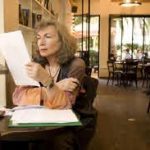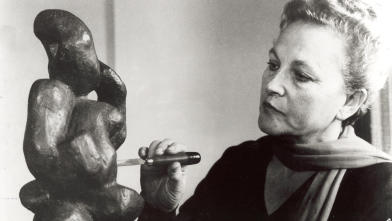By: Prof. Phyllis Chesler
Sometimes, we meet someone for the first time and it seems as if we’ve met them before or have always known them—and so it was when I first met Raquel Chalfi, the Israeli poet, so long ago that neither of us is sure when exactly it was. Did we meet in Tel Aviv in 1975, or in Jerusalem in 1977–or was it in 1980 in Jerusalem when she interviewed me about anti-Semitism for the front pages of the Israeli media?
I am not entirely sure. But I remember so clearly her tall, willowy, and rather extraordinary presence. She spoke softly, slowly, thoughtfully, carefully, theatrically, and, in another life, she might have been a hypnotist or a Sibyll. She was somehow a bit “otherworldly.” This was no ordinary journalist.

Indeed, Raquel was also a filmmaker and a student of mysticism. As a child, she had once lived in Mexico with her parents—and then she studied at Berkeley University in California. She produced documentaries for Israeli television, appeared on Israeli radio, and taught filmmaking at Tel Aviv University.
Raquel would become one of Israel’s major poets, winning the Israel Prime Minister’s Prize (1999), the Ashman Prize (1999), the Bialik Prize for Poetry (2006), the Brenner Prize for Poetry (2013), and the ACUM Prize for Lifetime Acheivement (2016). Her work has been praised by Ariel Hirschfeld, Dan Miron, Alicia Ostriker, and Amos Oz, and has been translated into French, German, Spanish, and Portuguese. In 2015, her Collected Poems were translated into English by Tzipi Keller and published by Excelsior Editions of the State University of New York Press.
But this award-winning Raquel is not my Raquel. My friend, my uncannily sister-like friend, is someone who knows how to listen deeply—even more so than the very best psychoanalysts whom I’ve been privileged to know; she ponders everything and does not speak frivolously. She is a very serious playmate—well, I am too.
My Raquel is married to Chaim Tadmon, the novelist, and for many years, the deep, baritone voice of Kol Yisrael. She is the mother of Daniel Tadmon who is now studying in New York. On so many of my early trips to Israel, Raquel and Chaim would insist on picking me up from wherever I was staying to drive me to the airport, to see me off with love.
My Raquel sits at a cafe near her apartment and writes there. When, years later, she moved about 45 minutes away, I asked her what cafe she was now writing in. Her answer both charmed and stunned me. “Pnina’la,” (for that’s what she sometimes calls me), “I am at the very same cafe. Chaim and I drive there faithfully every day.”
Talk about a “makom Kavod!” – A place of honor!
My Raquel is also the daughter of Shimshon Chalfi, the poet, who also did an extensive history of the first generation of Tel Avivians. Raquel’s uncle, Abraham, was also a poet as well an actor involved with HaKameri theater. Raquel’s mother, Miriam Chalfi, was a sculptor and also a poet.
A veritable dynasty of poets.
I met Miriam a few times and she gave me a small but formidable sculpture, an object-d’art, meant to be worn as jewelry. It is made of brass and I wore it for years, then I temporarily retired it.
Now that I’ve seen Raquel’s film about Miriam (The Hidden Fountain—The World of Miriam Chalfi), made over a period of 25 years, I plan to start wearing it again in her honor. She even signed it.
The Hidden Fountain has been seen at festivals, including the international Film Festival in Rotterdam, in 2020. It has not yet been released. Before viewing it privately, I was unaware of the greatness of Miriam’s Art. Her sculptures, which are in Israeli museums, are as if they’d already existed in Nature and were created over eons; they are elemental, ancient, massive, perhaps crafted by Betzalel or even thrown down by G-d. They are also maternally powerful. Somehow, they facilitate human meditation. And humility. One is, quite simply, awe-struck. Encountering Miriam’s sculptures is like standing among the silent stones above the tree-line of a great mountain that you’ve just climbed. There is only sky, wind, and stones, so many stones, and of different sizes, different shapes, different colors.
Miriam’s stones are smooth, they have been hand-made, but one gazes at them in wonder. Her work is spiritual, it evokes gratitude for Creation.
Miriam wanted no attention. She did not want a film. Raquel says that her mother was genuinely humble. She knew the power of her art but also viewed herself and her work as only a small part of the cosmos. But bit by bit, her daughter slowly wore her down, just as Miriam sands and smooths her material in order to release what’s hidden within. Even her beloved grandson, Daniel, played a role in getting Miriam to talk, explain, actually admit a camera into her studio.
Miriam’s life was hard, both as a Jew and as a woman. She was not allowed to study Art although she had yearned to do so from the time she was a child. As Raquel says: “For many years, she had to put this dream off—because of harsh and oppressive circumstances (in Europe). She was orphaned (when her mother died) while she was still a young child. She had to work hard to support her family.”
Only when she was older, could she begin—and she soon began winning prizes for her work. Her work is praised on camera by Menashe Kadishman, a “world-renowned Israeli artist and sculptor” and by Ariel Hirschfeld. “a leading art and literary critic.”
Raquel, like her mother before her, had to struggle financially to make this film. Both women were held back, not only because of money and family obligations, but because they were women.
Ba’yim ha’haym, ma hadash tahat ha shemesh? In that period, that was nothing new under the sun.
Raquel’s poetry is mystic, exquisite, philosophical, disorienting, until we realize that she is orienting us to constant change, constant movement, constant free fall. Sometimes she sounds like Sylvia Plath, sometimes like Paul Valery, but always like herself. Raquel writes about motherhood, madness, death, human bodies, magical cats, powerful witches, trees, about all “others” as “alien” (khai-zar), about aging, evolution, exotic animals, birds, bears, and clouds, wondrous clouds that speak to her as they shape-shift. Raquel is funny and self-critical. In a poem titled “Busy” she writes:
“I’m busy, I’m busy
Trying to dial myself but always
a busy signal
…..
Even if God dials my number
I’ll be busy.”
She embraces Jewish history in The Water Queen of Jerusalem:
“The Water Queen of Jerusalem
dived into history
History was hard and she grew fins
she had no air and she schemed
gills rowing and rowing through memory
The Water Queen of Jerusalem has
a bathing suit made of Yiddish”
“The Water Queen of Jerusalem wallows on a stone beach in Ladino fearing the rise of water levels in Arabic the Water Queen of Jerusalem has no sea in Jerusalem she has a history Jewish and she holds her head above water.”
Chalfi’s poem German Boot is an extraordinary meditation on the Torah, the Shoah, and on love and lust in the Promised Land. I cannot summarize it but I can strongly recommend it.
Her Mrs. Darwin is an enchanting piece of domesticity and thoughts upon Creation.
“Mrs. Darwin is sitting and knitting
.theorizing:
Evolution Evolution Evolution
But who created this Mechanism of
Evolution?
since it is after all apparent
that like our Mother Eve
.In other words there was someone who Created!
No?”
My Raquel is a modern woman, questioning everything, a secularist, whose thoughts never stray far from G-d.
Oh, how I wish we could stroll the streets of Tel Aviv together, beneath the leafy boulevards, young again, then sit at a cafe, talking the talk of Lost Girls in search of finding themselves through words, and thus, saving the world. We are both older now and our bones have grown soft and fragile, and we have both been put through what Raquel calls “the grinder” of many of the same ailments.
To me, my Raquel is forever ageless, she is all-ages. But the truth is the truth. Or as she writes in her poem Such Tenderness:
“Such tenderness in our body
as it abandons us
slowly
reluctant to hurt us
with a sudden jolt.
…..
Such beauty such tenderness
in our body that gradually betrays us
politely prepares us
tells us in whispers
bit-by-bit hour by hour
that it is leaving.”
But always, she will always cheer me up, with whimsical and soothing words. For example, in her poem, The Love of Trees:
“I who lack
an ancient calm
find myself hungry at their side
…..
And then
their simple roughness
speaks to my skin in whispering tongues
…
Listen listen people:
There’s nothing like a quiet embrace with a large tree to chase away
the demons.” (IsraelNationalNews.com)
The above article originally appeared on the Arutz Sheva web site. Their web address is: arutzsheva.com





